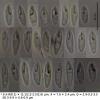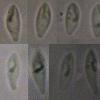
20-02-2026 18:47
 Marc Detollenaere
Marc Detollenaere
Hello Forum,On rotten wood of Fagus, I found some

07-02-2023 22:28
Ethan CrensonHello friends, On Sunday, in the southern part of

19-02-2026 17:49
Salvador Emilio JoseHola buenas tardes!! Necesito ayuda para la ident

19-02-2026 13:50
Margot en Geert VullingsWe found this collection on deciduous wood on 7-2-

16-02-2026 21:25
 Andreas Millinger
Andreas Millinger
Good evening,failed to find an idea for this fungu

08-12-2025 17:37
 Lothar Krieglsteiner
Lothar Krieglsteiner
20.6.25, on branch of Abies infected and thickened

17-02-2026 17:26
 Nicolas Suberbielle
Nicolas Suberbielle
Bonjour à tous, Je recherche cette publication :
Orbilia vitalbae?
Viktorie Halasu,
02-01-2022 22:35
 Hello,
Hello, I have here a small light rose to light orange Orbilia on xeric twig of Euonymus europaeus, small tree along a path near a riparian forest, coll. 1. 1. 2022.
Spores as shown. Paraphyses capitate. Asci 8-spored, lower spores inverted, dead ascus' apex is truncate, not thickened. No crystallic SCBs seen, globose SCBs present in excipulum. Slightly crenulate margin made of exudate "teeth". No glassy outgrowths.
Is it vitalbae or trapeziformis? The latter I've seen only once so I don't know the species well enough. But the spores seem to have more rounded lower pole and more note-shaped SB than trapeziformis.
Thank you in advance.
Viktorie
Hans-Otto Baral,
03-01-2022 07:35

Re : Orbilia vitalbae?
For my memory this looks more like trapeziformis because of the constantly subacute apex. SB shape is not far from what I illustrate in that species. But our concept of trapeziformis appears to be heterogeneous based on the few sequences, and vitalbae has very different spore lengths, I always wanted to divide it but finally gave up. Anyway, in vitalbae the rounded to obtuse spore apices strongly prevail.
Viktorie Halasu,
03-01-2022 10:16

Re : Orbilia vitalbae?
Dear Zotto,
thank you for clarifying this collection. I was thinking about vitalbae because I saw some similarity with the spores of HB 9165a (that untypical Swiss O. vitalbae on Sambucus racemosa). The other trapeziformis from the same forest had more attenuated lower spore ends.
Viktorie
thank you for clarifying this collection. I was thinking about vitalbae because I saw some similarity with the spores of HB 9165a (that untypical Swiss O. vitalbae on Sambucus racemosa). The other trapeziformis from the same forest had more attenuated lower spore ends.
Viktorie
Hans-Otto Baral,
03-01-2022 10:46

Re : Orbilia vitalbae?
Ah, these are typical! Indeed this Sambucus sample is dubious, we did not manage to assign it unequivocally, and an attempt to obtain DNA failed.


